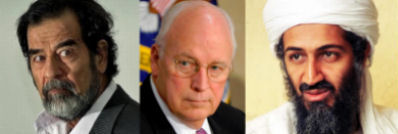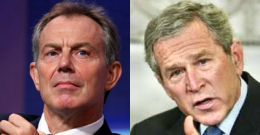Sir John Chilcot, moderator of the Iraq Inquiry, never tires of reminding us that the point of his hearings is "lessons learned" – what can we take from this dance of human-kind’s foibles that might be useful in the future? At times, his repetition is tedious, sounding like he wants us to "make nice" when "nice" isn’t what we feel. But, on the whole, we owe him a debt of gratitude for keeping us on task. History really does repeat itself and anything that we can do to dampen that phenomenon would be welcome, particularly when the piece of history is as absurd as this one. So I’m taking him up on his challenge. What have I learned from watching these interviews?
One thing jumps off the page, something that should be obvious. History may be the study of how large groups of people interact with each other, but it usually comes down to individual personae. This sordid tale hinges on the personalities of very similar men well known to all of us – clearly paranoid men – none of whom were at these hearings in person:

Listening to the interviews, the discussions that matter were with the people who tried [in vain] to deal with them. If there was anyone interviewed who mentioned a personal encounter with any of these characters in their testimony, I missed it. They were outside of the discourse. Even the obvious mastermind of US policies operated from behind closed doors. Likewise, I don’t think any of these men ever met with each other. Britain’s Chilcot Inquiry has been about how to deal with these remote figures – none of whom are British, none of whom were available, and all of whom were paranoid and close-minded. The men who met to negotiate our fate in these matters were not really the principals in the story:

These two world leaders seemed to be friends. They obviously listened to each other and changed what they were doing based on their meetings. They saw themselves as trying to figure out what to do about al Qaeda’s Osama Bin Laden and Iraq’s Saddam Hussein, characters that they thought were not amenable to negotiation. But there were three such people in play, and they didn’t address the third one – US Vice President Dick Cheney. It was a grievous omission that left both of them, US President George W. Bush and UK Prime Minister Tony Blair, looking acting like fools.
| LESSON: In any such debate, make a list of all players who are rigid and paranoid and do not believe in human negotiation or interaction as an effective means for the resolution of conflict. In every negotiation, never forget to consult the list to be sure all of them have been carefully taken under consideration, even people on your own team. The most dangerouspeople are the ones that don’t come to the table. |
History has long been shaped by men like the three above who don’t believe in discourse with other people, but instead only see their own exercise of power as a tool for change. They approach human interaction as if it’s a chess game with wooden figures being moved about on a board jockeying for power. Their strategies and plans are held in secret, but the goal never changes – winning the game. Chess games played by Masters often end in a draw, not because they realize that winning isn’t the point. They end in a draw because of a worthy adversary, and in the end, the draw only leads to playing a new game.
Throughout the latter half of the 20th Century, the world struggled with the Asian States – the U.S.S.R. and Communist China – with policy of Containment. If the world was going to be a chessboard, then we played it for a draw. Winning was out of the question in part because we didn’t want anything from them at the time and in part because it was not winnable. All we wanted was safety. We didn’t win, we just kept playing until our adversaries evolved into more reasonable states and began to focus on the needs of their own people rather than on their hegemony – and we did it with Containment.
| LESSON: If anything was to be learned from the invasion of Iraq, it was that the policy of Containment had worked quite well there. As Carne Ross said to the Inquiry, "I don’t remember anybody ever saying containment is collapsing. On the contrary, we would often begin those talks, those bilateral discussions, by congratulating ourselves on the success of containment…" The lesson is clear, patient containment is the way to deal with rogue states. It worked in the 20th Century, and it worked in Iraq with Saddam Hussein. |
-
Sir Jeremy Greenstock, UN Ambassador for the UK
-
Carne Ross, First Secretary UK Mission to New York
-
Sir Christopher Myer, UK Ambassador to the US 1997-2003
-
Sir David Manning, UK Ambassador to the US 2003-2007
-
Sir John Holmes, UK Ambassador to France
-
Dr. Hans Blix, Executive Chairman of UNMVIC.
As I listened to the testimony, it occurred to me that everything the UN did has turned out to be right: the containment of Iraq after the first Gulf War; responding to the US insistence that the inspectors be allowed to return to Iraq at the end of 2002; refusing to authorize the use of force in Iraq in March 2003.
| LESSON: The United Nations is an effective governing body for world conflict involving rogue states and conflicts between nations. In this case, the UN decisions were right-thinking. The world does not need a "sole super-power." We need what we have – the United Nations. |
| LESSON: In dealing with rogue states, regime change [a euphemism for deposing a leader] is not the right policy. In this case, it was a disaster. Democracy is a form of government that relies on the consent of the governed and is to be chosen, not imposed. As Hans Blix pointed out, we didn’t even really do a regime change. We destroyed an entire government and imposed Anarchy. |
There is a further lesson that needs to be addressed that the Chilcot Inquiry can’t help us with.
| LESSON TO BE FURTHER CONSIDERED: Neither the UN nor it’s nations have any idea how to deal with a pugilist like Osama Bin Laden and al Qaeda. Bush tried the "states that harbor him" route with little real effect. How does one depose a leader who has no state? How does one contain someone who occupies no container? We haven’t figured that out yet. |
[…] very wrong of us to invade the country in the first place – legally, morally, and strategically. As Dr. Hans Blix said in his testimony at the UK Chilcot Inquiry: The interesting thing: was Iraq a danger in 2003? […]